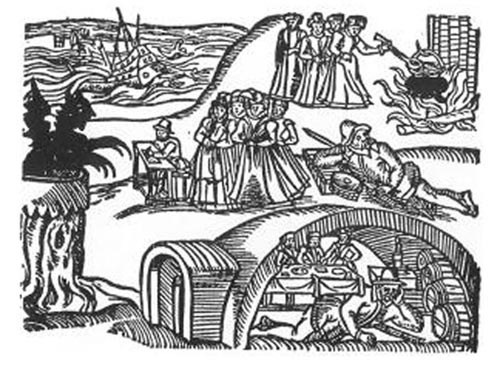THE execution of two dozen Scots witches in the 16th Century was sparked by a young boy’s lurid tale of an orgy, a Scottish academic has claimed.
The notorious witch hunt of 1597 resulted in 400 people going on trial and 200 executions during a six-month outbreak of hysteria across the country.
The bloodlust began in Dyce, Aberdeen, in January 1597 but what sparked the mass killings has never been identified before now.
Now Aberdeen University expert Professor Bill Naphy (corr) has uncovered evidence that a boy claimed to have been involved in a Halloween orgy with witches on the site of the present day Tollboth.
The “investigation” into the boy’s claims resulted in 24 executions of witches.
Prof Naphy, from the school of Divinity, History and Philosophy, “The first six months of the panic is entirely focused in Aberdeen and Aberdeenshire.
“They arrested a family in Aberdeen and the son confessed that at Halloween, he met with a group of witches at the Fish Cross which is in front of the present Tollbooth.
“That scared the daylights out of the city and they started to think they had a serious problem on their hands.”
He added: “Nearly a dozen women from the village of Lumphanan were killed – which at the time would’ve been a considerable proportion of the female population.
“Most historians know about the 1597 outbreak but it’s completely eclipsed by the Great Scottish Witch Hunt of 1590-1591 in Edinburgh and Lothian because that one involved the King.
“However the 1597 outbreak was much more widespread nationally.”
Prof Naphy said the executions, carried out in the city’s Gallowgate, were “spectacular events”.
He said: “The usual form of execution for a witch was to be tied to a stake, strangled and set on fire.
Hardly any records of the events survive – which makes the history of witchcraft in Scotland particularly difficult to document.
Professor Naphy added: “We have small pieces of information – we have bits of the trials of individuals which is why we have a few names.
“We also know there were a couple of people executed we don’t even have names for. Collectively we have a pretty good idea what happened.
“It appears to be down to relations – someone who was accused in one village, had a family relation in another village and so the investigation followed accordingly.”
By the mid-17th Century most places in Europe stopped prosecuting witches. The last successful prosecution under the 16th Century Witchcraft Act in Britain was in the 1940s. After that, all the Witchcraft Acts were repealed so it was no longer a crime.


